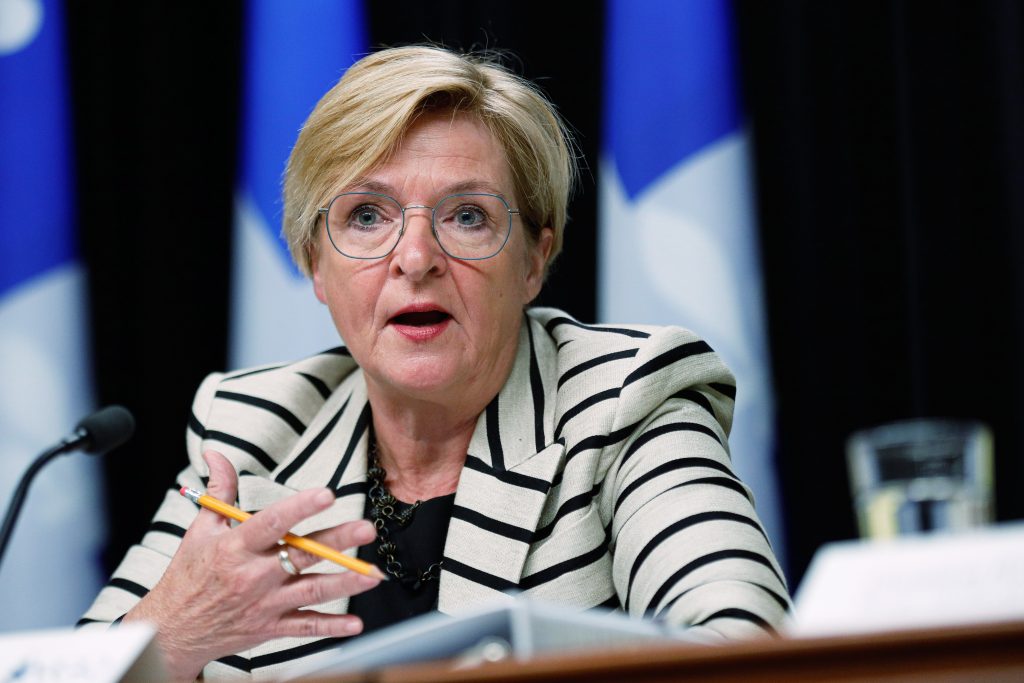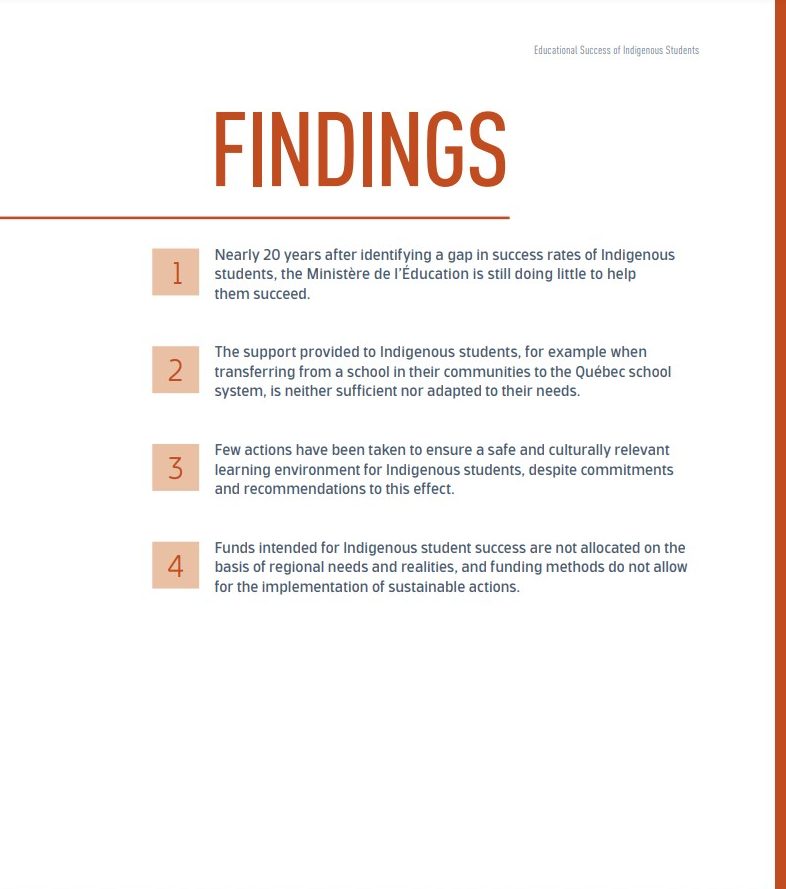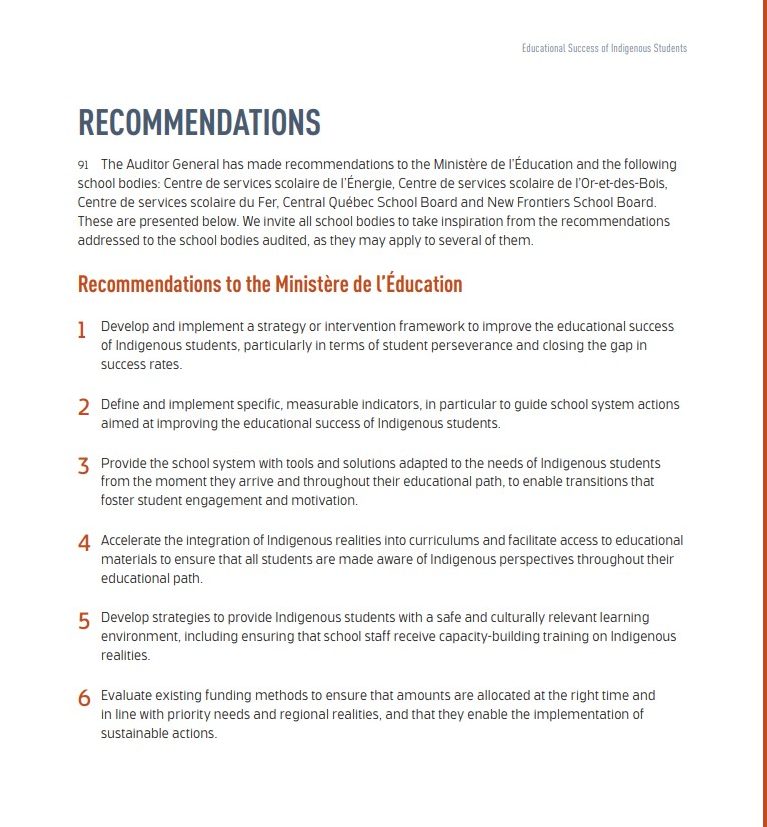Quebec auditor general says school system failing Indigenous students

Posted November 21, 2024 2:36 pm.
Last Updated November 21, 2024 10:40 pm.
Quebec’s auditor general says the province has taken little action in the past two decades to help Indigenous students in Quebec, whose graduation rates lag behind those of Indigenous students in other provinces.
In her report published Wednesday, Guylaine Leclerc said the Quebec government knew about a major gap in success rates between Indigenous and non-Indigenous students since at least 2005, but failed to provide the necessary funding and planning to narrow that divide.
“Nearly 20 years after noting a success gap among Indigenous students, the Education Department is still taking little action to promote their success,” the report said.
Leclerc’s report highlights significant statistics on the low success rate, with almost 40 per cent of Indigenous students in the period of 2014 to 2017 putting an end to their studies without having obtained a diploma or a certificate.

Denis Gros-Louis of the First Nations Education Council (FNEC) says these findings focus on off-reserve students attending the provincial schools, saying “It’s where the chaos begins.”
It references 2021 data from Statistics Canada that say the proportion of Quebec’s Indigenous population between 25 and 34 years old without degrees or certificates was 31.4 per cent — two-thirds higher than the province’s non-Indigenous population at 9.3 per cent.
“Let’s bring the table back, let’s identify those gaps,” Louis said on better communication. “I am convinced that we could work those barriers together.”
Louis said the FNEC has monitored record high success rates within community schools in recent years, though the decline when Indigenous youth leave their community and enter the provincial system, is prevalent.
“The ‘report card’ is about the poor capacity, the lack of know how, of the ministry to enable our students to graduate, that’s where their failing,” he said.
When students, many of whom don’t speak French fluently, transfer from schools in their communities into the province’s education system, they are given insufficient support, such as language training, the report said.

Assembly of First Nations Quebec-Labrador Chief Ghislain Picard says to see progress, the ball is now in Quebec’s court.
“Quebec has no policy and no strategy in terms of how communities are given the capacity to make that transition,” he said.
Picard said it can be frustrating as a simple solution would be for the chiefs and Ministry to sit down and find solutions, though he says this is something he’s never seen come to fruition.
The language barrier undermines the ability of students to succeed, Leclerc said in the report, adding that funding for Indigenous student language support is “minuscule” compared to what immigrant students in the province receive.
In the 2022-23 academic year, 10 per cent of Indigenous students in French schools received language support, compared to 46 per cent of immigrant students, the report said.
Leclerc said in her report that the province must do more to build trust between schools and Indigenous communities. “The majority of the staff we met who worked with Indigenous students had not received training on the realities of Indigenous students.”
Picard feels the same way saying the Ministry has not created a proper framework.
“I think the burden is really on Quebec, not on ourselves, its on Quebec to do what’s right from here,” Picard said.
“Don’t Indigenous people in this province deserve to know where this government is wanting to take them?” Picard asked.

In the report the Ministry of Education of Quebec acknowledges and agrees with the audit’s recommendations, asking Quebec education officials to define and implement indicators to improve Indigenous students’ success rates; train school staff on Indigenous realities; and develop culturally relevant learning environments.
Speaking to reporters at a news conference Wednesday, Leclerc said school staff may have good intentions but lack the knowledge to respond to Indigenous students’ needs in ways that resonate on a cultural level.
“Those professionals who work in those schools … don’t have the tools to work with those students. They don’t have sufficient training to work with those children,” Leclerc said at the Quebec legislature.
Neither the Quebec Education Department nor the Quebec minister responsible for First Nations and Inuit relations was immediately available for comment.
With files from The Canadian Press








